
Children from the Hungarian minority in Transcarpathia, Ukraine, as well as Ukrainian children from Mikolayiv and Kharkhiv, have been welcomed by staff and volunteers of the Rákóczi Association youth camp located in the picturesque hills of Eastern Hungary’s Sátoraljaújhely. Hundreds of children of different nationalities have shared in activities aimed at offering a respite from the everyday reality of war that surrounds them back home.
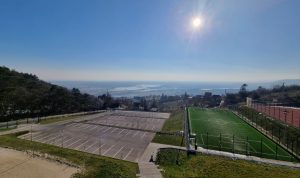
The view from the Sátoraljaújhely camp. Photo: Hungary Today
The Rákóczi Association has been the owner and operator of the event center since March 2019, thanks to the financial support of the Hungarian Government. The Rákóczi Camp and Event Center is one of the largest youth accommodation facilities in Eastern Hungary. It is located 300 meters above sea level in a five-hectare pine forest, and can accommodate up to 480 people at a time.
The renewed Rákóczi Camp and Event Center opened their doors in June 2021, with the aim of becoming a major meeting place for Hungarian youth in the coming decades. It houses as many as 10,000 children annually.
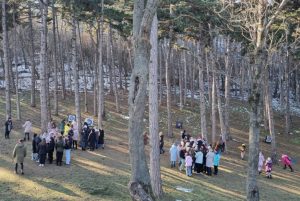
Archery has proved to be one of the most popular activities. Photo: Hungary Today
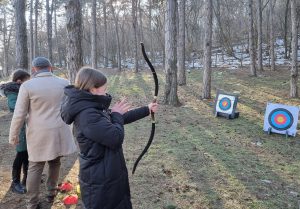
Sátoraljaújhely. Photo: Hungary Today
Some of the children attending the camp were from orphanages or have lost one of their parents in recent months due to fighting in the country. Maria Bíró runs the St. Michael Orphanage in Rativtsi (Rát) in Western Ukraine. They currently care for 25 children, who were placed with them by local social services due to children having abusive parents, or families that could not provide them with adequate care. They have a unique model, in which they provide foster parents, who themselves often come from difficult financial backgrounds, with free housing in return for adopting children in need. The Ukrainian state then pays the families some social support, but the Hungarian state also provided significant financial aid to the project. Some foster parents adopt as many as five to six children alongside their own biological offspring.
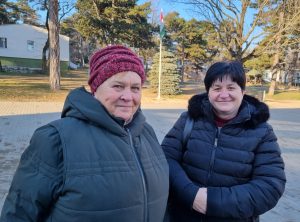
Mária Bíró (L), director of St. Michael’s Orphanage with her colleague Szilvia. Photo: Hungary Today
Thanks to volunteers who often come from the ranks of university students, teachers accompanying the children from Ukraine find some much needed time off to recover mentally and physically. Nóra and Natalia, teachers in a Hungarian school in Transcarpathia, both appreciate the unexpected bonus of being able to share their experiences with other teachers from the region as they sat around the table in the camp’s hotel lobby. Politics was never far from their minds though. They said that a week-long experience of normality that they have been gifted with in the Rákóczi camp is a welcome relief from the difficulties of war economy and emotional stress that is wearing them down back home.
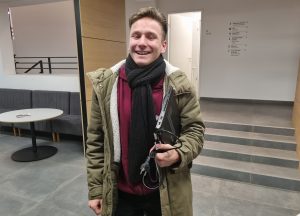
Ákos is one of the volunteers helping with the children. He is now a university student, but he also was a visitor to the camp while he was still a high-school student. Photo: Hungary Today
Both had complained of the endemic corruption that is plaguing the country even in war time. Natalia was especially distraught as her husband had been drafted into the army despite being 56 years old. She blamed corruption for the fact that he now has to eat rations that do not provide enough nutrition, and spend the nights in makeshift tents that do not protect against the elements. When asked where they would see the most effective solution to ending the war, both agreed that peace negotiations were the way forward. They do not believe that the war was a clash between Ukraine and Russia; they are of the the opinion that their country is a victim of a clash between superpowers.
Yulia and Zhanna are Ukrainian mothers accompanying Ukrainian children to the camp in Sátoraljaújhely. Some of the children in the group have lost their fathers in recent fighting, while other fathers are currently being treated in hospitals. Yulia had told us that when they hear an airplane in the sky above the camp, they still react with fear, due to the aerial campaign of the Russian military in their homeland.
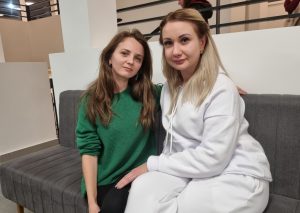
Zhanna (L) and Yulia (R). Photo: Hungary Today
When asked whether the children currently in the camp would be safe after their return to Mikolayiv and Kharkiv, Yulia shed some tears. She said that no one can now guarantee their safety. As to what they saw could be the solution to the earliest possible end to the war, both women agreed that Ukraine must fight on, and the world should give them material and moral support. They believe they have no other option, because Russia would interpret willingness to negotiate as weakness.
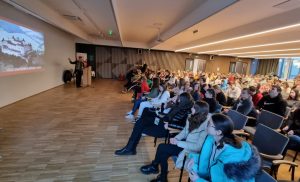
Children listen to the presentation about Hungarian music and history. Photo: Hungary Today
The day concluded with a prayer service led by former minister and Reformed Church Bishop Zoltán Balog. Hundreds of children have gathered in the camp’s training facility, where they sang a well-known song from the days of the 1848-49 Hungarian revolution and anti-Habsburg uprising.
The service was led by Zoltán Balog, who spoke about God being able to see the individual suffering of each and every one of us. The service was delivered in Hungarian, but Ukrainian translation was available for Ukrainian guests.
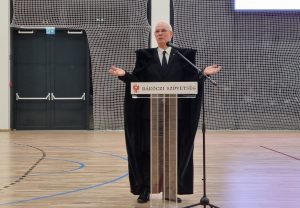
Bishop Zoltán Balog delivering a sermon in Sátoraljaújhely. Photo: Hungary Today
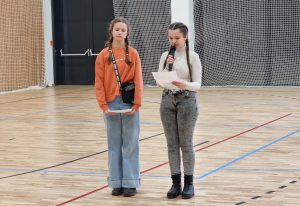
The Gospel of Luke was read out both in Ukrainian and Hungarian . Photo: Hungary Today
Csongor Csáky, President of the Rákóczi Association, was at hand to answer questions from the organizers, but also to make personal contact with the young guests. He often drives the 260 km distance from the Association’s headquarters in Budapest to Sátoraljaújhely multiple times a week.
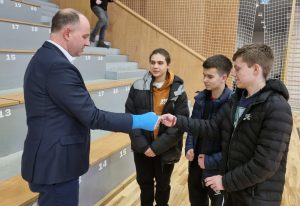
President of the Rákóczi Association Csongor Csáky hands his business card to the young guests. Sátoraljaújhely. Photo: Hungary Today
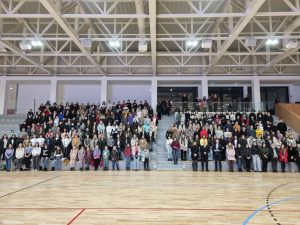
Sátoraljaújhely. Photo: Hungary Today
The week-long visit concluded with a group photo of all the visitors, before a new group will take their place in the coming weeks. Not only children, but also teachers asked what they would improve on if they could in the camp, and all unanimously replied that they wished they could stay longer.
Although the camp in Sátoraljaújhely will welcome both children and adults with very different views and experiences concerning conflict, nationalism, human rights abuses, or simply national identity in the region, its primary mission is not to erase such differences or to offer a common interpretation instead. Where it is most effective, is in offering a shared space to different visions and cultural heritages, and demonstrating a way forward to a peaceful civic co-existence among neighbors, outlining the fact that this is indeed possible.
Name: Kárpátaljai Családokért Egyesület
Account number: 11742348-21455979
IBAN: HU18117423482145597900000000
Donation must contain note: “For St. Michael’s Children’s Home”
Featured Image: File Photo, courtesy of Rákóczi Association